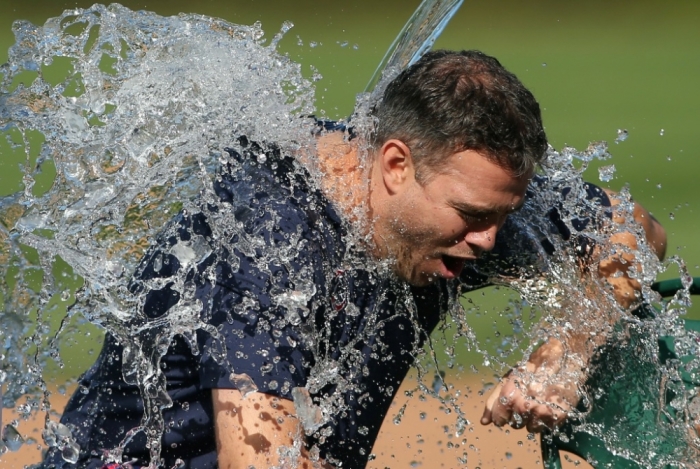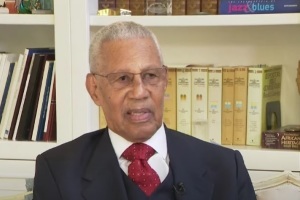'Ice Bucket Challenge:' 5 Reasons Some Say Beware

While many have brought greater awareness of and research support for ALS, or "Lou Gehrig's Disease," in a fun way with the "Ice Bucket Challenge," others have raised concerns about whether, or how, to participate. Here are five of the concerns some have raised.
1. ALS Association funds research using animals
Some have declined to participate in the Ice Bucket Challenge because the ALS Association, the organization that most participates have donated to, supports testing on animals.
Actress Pamela Anderson decided not to participate, she wrote on her Facebook page, after, "digging a bit deeper."
"Recent experiments funded by the ALS Association, mice had holes drilled into their skulls, were inflicted with crippling illnesses, and were forced to run on an inclined treadmill until they collapsed from exhaustion. Monkeys had chemicals injected into their brains and backs and were later killed and dissected," she wrote.
People for the Ethical Treatment of Animals praised Anderson's response.
Claire Elise Boucher, a musician better known as Grimes, also declined to participate in the challenge due to animal testing.
In response, ALSA wrote: "Significant advances have been made in ALS and other neurological disorders such as Alzheimer's Disease and Parkinson's Disease using model systems such as rodents, flies and worms to better understand disease mechanisms and to develop therapies. With advances in technology made possible through research funding from The ALS Association, different approaches to minimize the use of these model systems are being developed."
ALSA also said it would honor any request from any of its donors who do not wish for their donation to be used for any particular type of research.
2. ALS Association funds research using human embryos
ALSA has supported research on stem cells from a destroyed human embryo and has said it may fund similar research in the future. Because of this, pro-life groups have urged those participating in the Ice Bucket Challenge to give their donation to one of several organizations that that supports ALS research but does not support embryonic stem cell research.
The Ethics and Religious Liberty Commission has a "FAQ" page on the Ice Bucket Challenge that includes a list of organizations that do not support embryonic stem cell research.
3. It might be against the law for some government workers
Some government employees have been warned that participating in the Ice Bucket Challenge could be an ethics violation.
The U.S. State Department, Department of Defense and House of Representatives have all warned certain employees about participating in the challenge.
House members are not allowed to use their official resources to promote a private charity, according to their "Ethics Manual." After the Committee on House Administration reminded members of this, several members deleted their Ice Bucket Challenge videos from their official social media accounts. House members are still allowed to post the videos on their personal or campaign accounts.
Members of the U.S. Armed Forces and other Department of Defense employees are not allowed to participate in the challenge if they identify themselves as such in the video. This means no uniforms. Doing so, DoD's general counsel said, could be an implied endorsement by the Defense Department.
U.S. diplomats and other high-profile foreign service officers are totally barred from participating in the challenge. The State Department sent a cable to employees noting that it is against their rules, "no matter how worthy a cause."
All these prohibitions are against the posting of an Ice Bucket Challenge video. Any government employee can, of course, still donate their own money to the cause, or dump ice water on their heads without posting a video.
4. It wastes water
Some have declined the Ice Bucket Challenge because it is a waste of water, particularly in California, which is undergoing a serious drought.
Actor Zachary Quinto wrote that he would donate to ALSA, but would not dump ice water on his head due to California's drought and the lack of clean drinking water in developing countries.
In addition to criticizing Californians for participating in the Ice Bucket Challenge during the drought, PETA also criticized California Gov. Jerry Brown for dumping the water on Sutter, his dog, instead of himself. The video shows Sutter in front of a water conservation sign and the status update below the video reads, "A small bucket for a big cause."
According to one estimate, about 5 million gallons of water have been used for the Ice Bucket Challenge so far.
5. It is "slactivism;" doesn't really help
The Ice Bucket Challenge is, or borders on, "slacktivism," some say.
Slacktivism is when promoting a charity or cause on social media is more about making one feel good about oneself than actually making a difference.
"Yet it's hard to shake the feeling that, for most of the people posting ice bucket videos of themselves on Facebook, Vine and Instagram, the charity part remains a postscript," Will Oremus wrote for Slate.
"Remember, the way the challenge is set up, the ice-drenching is the alternative to contributing actual money. Some of the people issuing the challenges have tweaked the rules by asking people to contribute $10 even if they do soak themselves. Even so, a lot of the participants are probably spending more money on bagged ice than on ALS research," Oremus added.
"As for 'raising awareness,' few of the videos I've seen contain any substantive information about the disease, why the money is needed, or how it will be used. More than anything else, the ice bucket videos feel like an exercise in raising awareness of one's own zaniness, altruism, and/or attractiveness in a wet T-shirt."
For other versions of the "slactivism" charge, check out Jacqueline Herrera, co-founder of Kitechild, or Ben Kosinski, founder of Sumpto, on their Huffington Post blogs.
As of last Thursday, ALSA reported $41.8 million has been raised and there have been 739,275 new donors since Ice Bucket Challenge began.




























